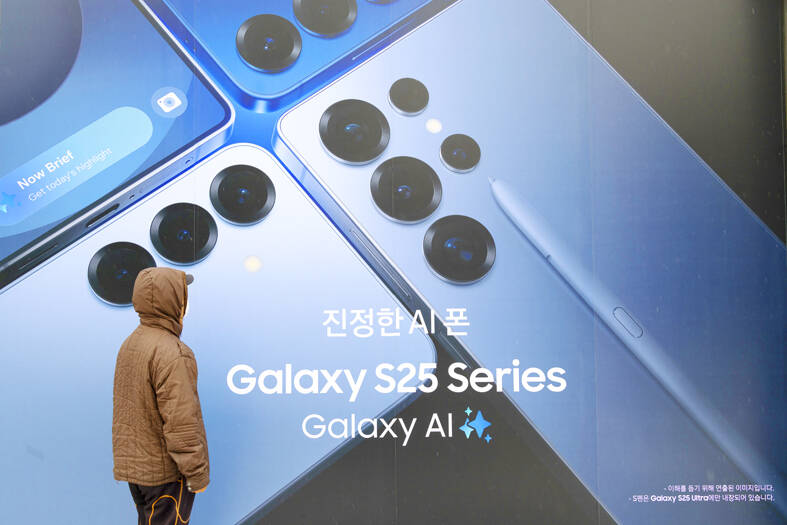The operating profit of South Korean tech giant Samsung Electronics Co sank almost a third in the fourth quarter of last year owing to spending on research, the company said yesterday, as analysts said it was struggling to meet demand for chips used in artificial intelligence (AI) servers.
The world’s largest memorychip maker had already acknowledged in October last year that it was facing a “crisis,” and acknowledged questions had arisen about its “fundamental technological competitiveness and the future of the company.”
Samsung said operating profit fell to 6.5 trillion won (US$4.5 billion) in October-December, from 9.18 trillion won in the previous three months. However, it was up 130 percent year-on-year.

Photo: EPA-EFE
Sales rose 11.8 percent to 75.78 trillion won and net profit rose 22.2 percent to 7.75 trillion won year-on-year, topping forecasts according to Yonhap News Agency.
The firm said the fourth-quarter fall-off was down to “soft market conditions especially for IT products, and an increase in expenditures including R&D,” as well as the “initial ramp-up costs to secure production capacity for cutting-edge nodes.”
It warned that in the first three months of this year “overall earnings improvement may be limited due to weakness in the semiconductors business.”
US titan Nvidia Corp, whose semiconductors power the AI industry, has been relying on SK Hynix Inc as its main supplier of high-bandwidth memory (HBM) chips for its AI graphics processing units (GPU), while Samsung has been struggling to meet the US firm’s requirements.
Still, Bloomberg reported yesterday that Samsung had obtained approval to supply a “version of its fifth-generation high-bandwidth memory chips” to Nvidia, citing people familiar with the matter. Samsung declined to comment on the report.
The earnings figures come as industry leaders try to assess the outlook for the sector after Chinese start-up DeepSeek (深度求索) unveiled a groundbreaking chatbot that performed as well as AI pacesetters — apparently for a fraction of the cost.
News of DeepSeek’s new R1 chatbot has sparked a rout in tech titans and raised questions about the hundreds of billions of dollars invested in AI in recent years.
Worries about the impact of DeepSeek battered stocks in Seoul yesterday as the market reopened after an extended break.
Samsung ended down more than 2 percent, while SK Hynix lost 9.9 percent, having earlier plunged almost 12 percent.
Jaejune Kim, executive vice president of Samsung’s memory business, said in an earnings call that the company was “monitoring industry trends considering various scenarios,” as it also supplies HBM chips used in GPUs to various clients.
“While it is premature to make judgements based on the currently limited information, we anticipate that long-term opportunities and short-term risks will coexist in the market,” he said.
He added that Samsung was determined to “actively respond to the rapidly evolving AI market.”
Counterpoint Research vice president Neil Shah said DeepSeek’s “frugal innovation” could potentially slow down or stretch the hundreds of billions of dollars in AI infrastructure investments over the years.
“So, this could be a ‘blessing in disguise’ for Samsung, allowing them to take the time needed to perfect their solution or to lower costs,” he added.

In Italy’s storied gold-making hubs, jewelers are reworking their designs to trim gold content as they race to blunt the effect of record prices and appeal to shoppers watching their budgets. Gold prices hit a record high on Thursday, surging near US$5,600 an ounce, more than double a year ago as geopolitical concerns and jitters over trade pushed investors toward the safe-haven asset. The rally is putting undue pressure on small artisans as they face mounting demands from customers, including international brands, to produce cheaper items, from signature pieces to wedding rings, according to interviews with four independent jewelers in Italy’s main

Japanese Prime Minister Sanae Takaichi has talked up the benefits of a weaker yen in a campaign speech, adopting a tone at odds with her finance ministry, which has refused to rule out any options to counter excessive foreign exchange volatility. Takaichi later softened her stance, saying she did not have a preference for the yen’s direction. “People say the weak yen is bad right now, but for export industries, it’s a major opportunity,” Takaichi said on Saturday at a rally for Liberal Democratic Party candidate Daishiro Yamagiwa in Kanagawa Prefecture ahead of a snap election on Sunday. “Whether it’s selling food or

CONCERNS: Tech companies investing in AI businesses that purchase their products have raised questions among investors that they are artificially propping up demand Nvidia Corp chief executive officer Jensen Huang (黃仁勳) on Saturday said that the company would be participating in OpenAI’s latest funding round, describing it as potentially “the largest investment we’ve ever made.” “We will invest a great deal of money,” Huang told reporters while visiting Taipei. “I believe in OpenAI. The work that they do is incredible. They’re one of the most consequential companies of our time.” Huang did not say exactly how much Nvidia might contribute, but described the investment as “huge.” “Let Sam announce how much he’s going to raise — it’s for him to decide,” Huang said, referring to OpenAI

The global server market is expected to grow 12.8 percent annually this year, with artificial intelligence (AI) servers projected to account for 16.5 percent, driven by continued investment in AI infrastructure by major cloud service providers (CSPs), market researcher TrendForce Corp (集邦科技) said yesterday. Global AI server shipments this year are expected to increase 28 percent year-on-year to more than 2.7 million units, driven by sustained demand from CSPs and government sovereign cloud projects, TrendForce analyst Frank Kung (龔明德) told the Taipei Times. Demand for GPU-based AI servers, including Nvidia Corp’s GB and Vera Rubin rack systems, is expected to remain high,